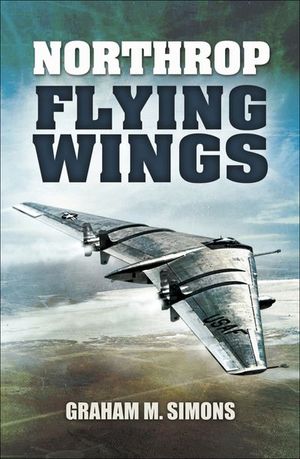Northrop Flying Wings
Published by Pen & Sword Books
The aviation historian and author of Memphis Belle presents an authoritative analysis of the groundbreaking, post-WWI series of military aircraft.
In the years following the First World War, a new imperative arose in aviation technology: stealth, speed, and precision. American aircraft designer Jack Northrop developed a streamlined craft that did away with superfluous appendages, including the weighty fuselage and tail units. This was an extreme measure, but Northrop was determined to push aircraft design to a new level.
Eliminating both the fuselage and tail meant placing the pilot, the engines, and the payload entirely within the wing envelope. The resulting craft, Northrop’s flying wings, were some of the most spectacular machines ever to grace the skies. With barely any vertical surfaces at all, they looked like something from the realm of science fiction. Indeed, one even appeared in the film version of H.G. Wells’ War of the Worlds.
Written off by many as a mere novelty, the development of these unique bombers provided aeronautical innovations that paved the way for a raft of new designs. During the 1970s, when the United States needed a new strategic bomber to replace the B-52 Superfortress, the flying wing design was brought to the fore once again. The B-2 Spirit was born out of this, continuing the legacy of this stealthy design. This craft, along with the B-35, the eight-engined YB-49 and the YRB-49A, are all highlighted in this authoritative history. Detailed analyses of each design, set within a wider historical context, make for a compelling record of this landmark design.
In the years following the First World War, a new imperative arose in aviation technology: stealth, speed, and precision. American aircraft designer Jack Northrop developed a streamlined craft that did away with superfluous appendages, including the weighty fuselage and tail units. This was an extreme measure, but Northrop was determined to push aircraft design to a new level.
Eliminating both the fuselage and tail meant placing the pilot, the engines, and the payload entirely within the wing envelope. The resulting craft, Northrop’s flying wings, were some of the most spectacular machines ever to grace the skies. With barely any vertical surfaces at all, they looked like something from the realm of science fiction. Indeed, one even appeared in the film version of H.G. Wells’ War of the Worlds.
Written off by many as a mere novelty, the development of these unique bombers provided aeronautical innovations that paved the way for a raft of new designs. During the 1970s, when the United States needed a new strategic bomber to replace the B-52 Superfortress, the flying wing design was brought to the fore once again. The B-2 Spirit was born out of this, continuing the legacy of this stealthy design. This craft, along with the B-35, the eight-engined YB-49 and the YRB-49A, are all highlighted in this authoritative history. Detailed analyses of each design, set within a wider historical context, make for a compelling record of this landmark design.
BUY NOW FROM
COMMUNITY REVIEWS

